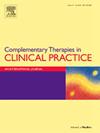Optimal exercise dosage and type for improving post-traumatic stress disorder: a systematic review and network meta-analysis of randomized controlled trials
IF 2.2
3区 医学
Q2 INTEGRATIVE & COMPLEMENTARY MEDICINE
引用次数: 0
Abstract
Objective
Post-traumatic stress disorder (PTSD) is a debilitating mental health condition. Emerging evidence suggests exercise may be effective in alleviating PTSD symptoms. This systematic review and network meta-analysis aimed to identify the most effective types and dosages of exercise for managing PTSD in adults.
Methods
A systematic search of six databases (PubMed, Embase, Web of Science, SPORTDiscus, Scopus, PsycINFO) through November 2024 identified randomized controlled trials involving adults with PTSD. Two reviewers independently screened studies, extracted data, and assessed risk of bias using the Cochrane Risk of Bias 2.0 tool. Standardized mean differences (SMDs) with 95 % confidence intervals (CIs) were calculated. The GRADE framework was used to assess evidence certainty.
Results
Thirty randomized controlled trials involving 1435 participants were included. An inverted U-shaped dose-response relationship was found between exercise dosage and PTSD symptom reduction, with the greatest effect at ∼730 Metabolic Equivalent of Task minutes per week (SMD = 0.53; 95 % CI: 0.28–0.82). Multicomponent exercise showed the strongest benefits. Optimal outcomes were linked to 30-min sessions, more than four times per week, at moderate-to-vigorous intensity.
Conclusion
Exercise exerted a non-linear dose-response effect on post-traumatic stress disorder symptoms, with optimal benefits observed at approximately 730 Metabolic Equivalent of Task minutes per week. Meanwhile, multicomponent exercise was identified as the most effective modality. Short-duration, high-frequency, high-intensity regimens yielded the greatest improvements. However, the overall current certainty of the evidence was moderate-to-low due to heterogeneity among studies. Therefore, further high-quality trials are necessitated to establish optimal doses, exercise types, and individual variability in response.
Registration
PROSPERO (CRD4202412345111)
改善创伤后应激障碍的最佳运动剂量和类型:随机对照试验的系统回顾和网络荟萃分析
目的创伤后应激障碍(PTSD)是一种使人衰弱的心理健康状况。新出现的证据表明,运动可能对缓解PTSD症状有效。本系统综述和网络荟萃分析旨在确定治疗成人创伤后应激障碍最有效的运动类型和剂量。方法系统检索了六个数据库(PubMed, Embase, Web of Science, SPORTDiscus, Scopus, PsycINFO),并于2024年11月确定了涉及成年PTSD患者的随机对照试验。两位审稿人独立筛选研究,提取数据,并使用Cochrane risk of bias 2.0工具评估偏倚风险。计算95%置信区间(ci)的标准化平均差(SMDs)。GRADE框架用于评估证据的确定性。结果共纳入30项随机对照试验,1435名受试者。在运动剂量和PTSD症状减轻之间发现了倒u型剂量-反应关系,在每周代谢当量任务分钟(SMD = 0.53;95% ci: 0.28-0.82)。多组分运动显示出最强的益处。最佳结果与30分钟的锻炼有关,每周锻炼四次以上,强度在中等到高强度之间。结论运动对创伤后应激障碍症状具有非线性剂量反应效应,在每周约730代谢当量任务分钟时观察到最佳效果。同时,多组分运动被认为是最有效的方式。短时间、高频率、高强度的治疗效果最好。然而,由于研究之间的异质性,目前证据的总体确定性为中等至低。因此,需要进一步的高质量试验来确定最佳剂量、运动类型和个体反应的可变性。RegistrationPROSPERO (CRD4202412345111)
本文章由计算机程序翻译,如有差异,请以英文原文为准。
求助全文
约1分钟内获得全文
求助全文
来源期刊

Complementary Therapies in Clinical Practice
INTEGRATIVE & COMPLEMENTARY MEDICINE-
CiteScore
6.30
自引率
6.70%
发文量
157
审稿时长
40 days
期刊介绍:
Complementary Therapies in Clinical Practice is an internationally refereed journal published to meet the broad ranging needs of the healthcare profession in the effective and professional integration of complementary therapies within clinical practice.
Complementary Therapies in Clinical Practice aims to provide rigorous peer reviewed papers addressing research, implementation of complementary therapies (CTs) in the clinical setting, legal and ethical concerns, evaluative accounts of therapy in practice, philosophical analysis of emergent social trends in CTs, excellence in clinical judgement, best practice, problem management, therapy information, policy development and management of change in order to promote safe and efficacious clinical practice.
Complementary Therapies in Clinical Practice welcomes and considers accounts of reflective practice.
 求助内容:
求助内容: 应助结果提醒方式:
应助结果提醒方式:


